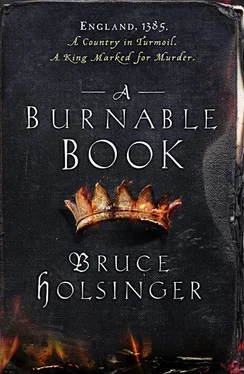Bruce Holsinger - A Burnable Book
Здесь есть возможность читать онлайн «Bruce Holsinger - A Burnable Book» — ознакомительный отрывок электронной книги совершенно бесплатно, а после прочтения отрывка купить полную версию. В некоторых случаях можно слушать аудио, скачать через торрент в формате fb2 и присутствует краткое содержание. Год выпуска: 2013, Издательство: HarperCollins Publishers, Жанр: Исторический детектив, на английском языке. Описание произведения, (предисловие) а так же отзывы посетителей доступны на портале библиотеки ЛибКат.
- Название:A Burnable Book
- Автор:
- Издательство:HarperCollins Publishers
- Жанр:
- Год:2013
- ISBN:нет данных
- Рейтинг книги:4 / 5. Голосов: 1
-
Избранное:Добавить в избранное
- Отзывы:
-
Ваша оценка:
- 80
- 1
- 2
- 3
- 4
- 5
A Burnable Book: краткое содержание, описание и аннотация
Предлагаем к чтению аннотацию, описание, краткое содержание или предисловие (зависит от того, что написал сам автор книги «A Burnable Book»). Если вы не нашли необходимую информацию о книге — напишите в комментариях, мы постараемся отыскать её.
A Burnable Book — читать онлайн ознакомительный отрывок
Ниже представлен текст книги, разбитый по страницам. Система сохранения места последней прочитанной страницы, позволяет с удобством читать онлайн бесплатно книгу «A Burnable Book», без необходимости каждый раз заново искать на чём Вы остановились. Поставьте закладку, и сможете в любой момент перейти на страницу, на которой закончили чтение.
Интервал:
Закладка:
I have witnessed many deaths. Hangings, quarterings, drownings, knifings on the Southwark streets. Once I watched at a tournament as a knight of the king’s chamber was decapitated by a lance, his blood arcing toward the stands, his head falling to the earth with a gruesome finality as hundreds of England’s highest of birth held their stomachs.
Yet nothing had quite prepared me for the grim work of these Southwark maudlyns as they swarmed toward Sir Stephen Weldon, covering him like a hill of ants meeting a honeyed bun. They gouged his eyes, bit his ears, pummelled his neck and his stomach. They stretched his arms and legs to their full length, tore off his clothing, and wrote their fury on his bare skin. They killed him with their fingers, their fists, their feet. They killed him with their teeth and their nails. The way his body was tossed among them they might have been a pack of dogs at a hart. I could almost feel sorry for Weldon, despite the private satisfaction I took in his death.
‘Enough!’ I shouted into the dim light. ‘Enough!’
The fury slowed. The young man who had leapt from the window crawled toward the far wall, moaning with the pain of a broken leg. He made it to the side of the slight man I had seen on Rose Alley. The two embraced. Beside them was Millicent Fonteyn, the laysister from Bromley, holding her mother’s outstretched body in her arms. The maudlyns circled their dead bawd, pawing at her bloody neck and chest. I stared at them, wondering at their peculiar courage.
A wheeze from the floor. I looked down with amazement at Weldon. Incredibly, the knight was alive, though clearly moments from his last breath. I knelt beside him, shielding his broken frame from view of the maudlyns, who were still crowded around their dead bawd.
He looked at me, blankly at first, then his sole remaining eye flashed recognition as the ragged edges of his lips lifted into a thin, cruel smile. ‘Hawks,’ he croaked, his windpipe nearly crushed. ‘Hawks always strike twice, Gower.’
‘What’s that you say?’ I hissed, shaking him, wondering what secrets would die with this man, wishing I could buy them all. I slapped his face. ‘Who are the hawks, Weldon? When will they strike?’
‘Always twice,’ he said, then his eyes froze in death, the meaning of his final words lost in the slaked howling of the whores.
The fingers throb, the eyes weaken, the bent back aches. I have scraped these words throughout this long winter night, all the while picturing you in Rome, venturing out from the abitato to walk with the sheep among the ruins, clearing your fine head after a day of subterfuge at the papal curia.
Such pleasant thoughts must now be pushed aside, and this sad tale brought to an end.
Simon Gower, no fool, had been watching us most carefully: our subtle looks, our secretive gestures, the wanton press of skin on skin as we made our greetings. He sensed the rising heat between us, our swelling need.
Jealousy is as fierce as the grave, the Song of Solomon teaches us, fuel of the truest fire and the fiercest flames.
It started, it must have started, with the cloth. My piece of youthful handiwork had hung in the gallery for over ten years, embroidered with the livery of Wales and Lancaster, both sons of old King Edward. The only distinction between their heraldry was in the labels: three points argent on Prince Edward’s, three points ermine on Lancaster’s.
As I recollect it now it seems so obvious, yet so darkly ingenious at the same time. With the death of Prince Edward, the royal arms passed to his son, then a child but now the king, who retained his father’s label of three points argent. In every respect King Richard’s arms match King Edward’s. To anyone viewing the cloth in our day, the duke would appear to be attacking not Prince Edward, but King Richard.
Ermine against argent. Duke against king. Once a scene of noble rescue embroidered by a lost girl, the cloth now showed a spectacle of royal murder.
If the cloth inspired Simon Gower’s betrayal, it was his envy of you, my heart, that guided his pen. ‘Why, if Geoffrey Chaucer can fool his readers with counterfeited prophecies, so can I!’
But how did he do it? Let your thoughts take you back just four weeks, the day before your company’s departure to Rome. You will remember your distress one morning at my father’s house. ‘My little book has gone missing from my rooms on the Via dei Calzaiuoli,’ you whispered to me, your hand pushing through your thick hair. ‘The quire is gone, and with it the prophecies I wrote for you.’
Yet your anguish seemed too great for such a trifle. Yes, you had written me an amusing poem, but its loss would hardly merit the fear I read on your face. There was more to this book, I suspected, something in it other than your clever prognostications.
It was Simon, of course, who stole your little book — stole it, copied it, then augmented your work with a poetical prophecy of his own. A thirteenth prophecy, added to your twelve, bringing the book’s dark matter into the present time.
The victim?
England’s young king.
The chief conspirator?
The king’s uncle. The duke who saved my mother’s life, and my own.
In the prophecy Lancaster is marked by his livery and his name, both disguised as they were in another poem you once shared with me. You called it an elegy, and you wrote it for the duke himself, on the death of his first wife. I can still recall the line, the company riding toward ‘a long castle with white walls’ as they pursue a white hart.
Lancaster, the White Hart: here again Il Critto chose carefully. His prophecy imputes the regicide to this same ‘long castle,’ a magnate and kingmaker whose identity the verses barely conceal. Still less do they disguise the alleged victim, young Richard, whose badge bears the white hart.
Nor do they obscure the identity of the author, despite your amusing effort to credit the work to your invented Lollius. Anyone familiar with your Book of the Duchess would easily detect your handiwork.
This, I believe, was Simon’s hope. A master of deception, he used old parchment and disguised his hand to make the book take on greater antiquity. He then decorated the margins with plain but skilful drawings of the thistleflowers, plums, hawks, and swords that answered to the playing cards evoked in the prophecies.
Now it needed a final touch. Simon paid me a last visit on Epiphany Sunday, soon after your departure for Rome. Gone was the cavilling bitterness he had shown while the two of you were tilting for my attention. Instead he was all smiles and warmth. He expressed regret for his earlier behaviour, and we parted on the most pleasant terms.
The sole purpose of his visit, I know now, was to pilfer the cloth. He must have unpinned it from the tapestry while my attention was diverted, stuffed it away even as he lisped his pleasantries. It was then an easy matter to commission the embroidery of those simple shapes from Hawkwood’s playing cards: plums, thistleflowers, hawks, and swords, surrounding the royal livery, tying the cloth inextricably to the book.
Now all that remained was to get the book into the hands of his master. ‘By kingmaker’s cunning a king to unking.’ Simon wrote that line for Hawkwood. He knew this man, his grandiose designs, his thirst for new legitimacy in his homeland. To imagine himself as the kingmaker would feed his ambition and stoke his pride.
Yet to present the book directly to the great condottiero would have been unwise. Hawkwood is known to be changeable, and he might well have suspected a trap. So Simon arranged to have the prophecies made known to Hawkwood, dangled in front of the man like a riverbug before a pike.
Читать дальшеИнтервал:
Закладка:
Похожие книги на «A Burnable Book»
Представляем Вашему вниманию похожие книги на «A Burnable Book» списком для выбора. Мы отобрали схожую по названию и смыслу литературу в надежде предоставить читателям больше вариантов отыскать новые, интересные, ещё непрочитанные произведения.
Обсуждение, отзывы о книге «A Burnable Book» и просто собственные мнения читателей. Оставьте ваши комментарии, напишите, что Вы думаете о произведении, его смысле или главных героях. Укажите что конкретно понравилось, а что нет, и почему Вы так считаете.












